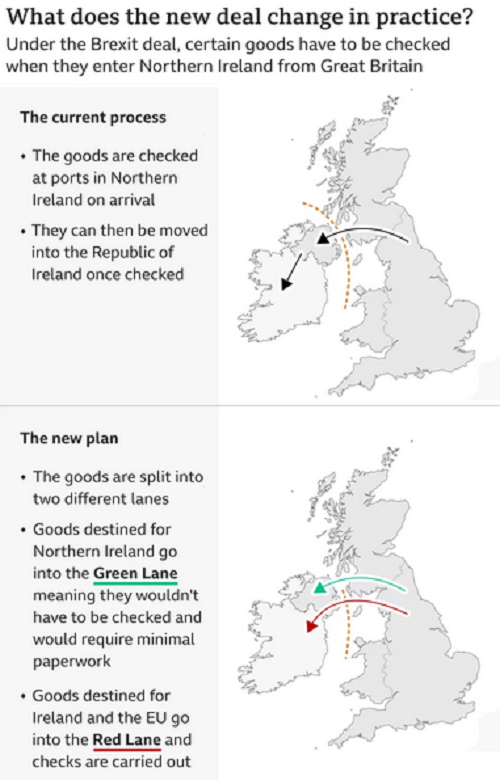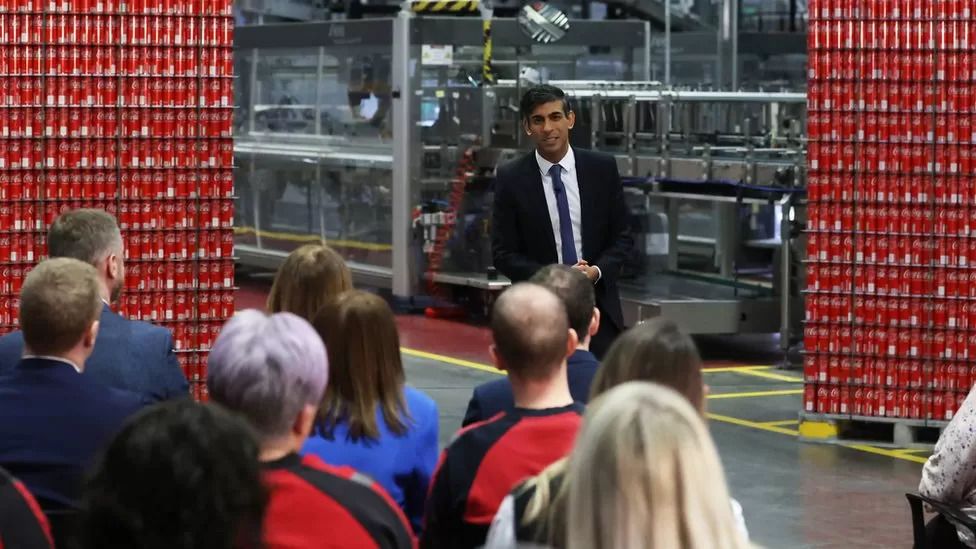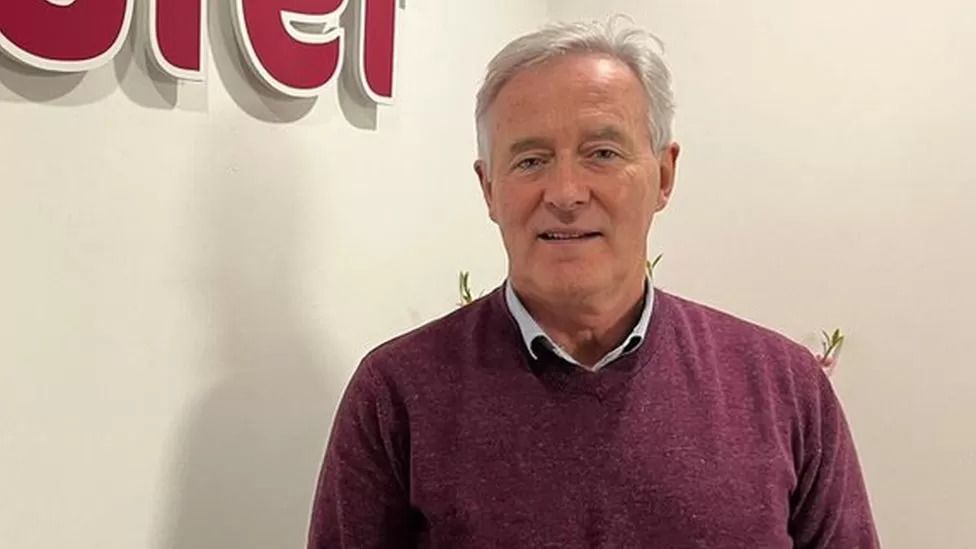
Brexit: Pressure builds on DUP over new deal
The party is boycotting devolved government until concerns about post-Brexit trading arrangements are fixed.
A new EU-UK agreement was announced on Monday, which PM Rishi Sunak said would make Northern Ireland "the world's most exciting economic zone".
The DUP said it would take time to come to a "collective decision".
On Tuesday, its party leader Sir Jeffrey Donaldson added: "I see opportunity of course, in terms of growing the Northern Ireland economy but is this the right framework in which to do it?"
He explained the DUP would take legal advice and "want to be sure that what is on the table does what it says and that it is good for Northern Ireland".
The prime minister was in Northern Ireland on Tuesday to promote the new deal - the so-called Windsor Framework - which will reduce checks on goods going from Great Britain to Northern Ireland.
Sinn Féin vice-president Michelle O'Neill said she spoke to Mr Sunak and told him to keep up the momentum.
"People are now clearly focused on getting an executive up and running and want all parties around the table working together to deliver for workers, families and local businesses," she said.
Her party leader, Mary Lou McDonald, added there was "no justification for the DUP to continue this reckless and damaging boycott of democracy".
Speaking after a meeting with Mr Sunak, Ulster Unionist Party (UUP) leader Doug Beattie said it was "disingenuous" for any political party to suggest it would take weeks or months to respond to the Windsor Framework.
"We need to hear from business, we need to know if it works for them. People need to show the courage of their convictions, look at the deal, come up with your analysis and make your pitch."
Alliance Party leader Naomi Long said the deal should have been signed four years ago if, she described, the UK had a "serious" prime minister at the time.
"I think this is a good deal for Northern Ireland, whether it is a good deal for the DUP or not is for them to decide but I can say with certainty and confidence is there not is going to get a better one," Mrs Long continued.
'Overselling'
Jim Allister, leader of Traditional Unionist Voice (TUV) said the agreement "does not live up to the overselling spin which accompanied it".
"As for it being enough to cause unionists to give up its Stormont leverage and settle for this deal, which comes with the added packaging of a Sinn Fein First Minister, then, no thanks," he said.
The DUP and Social Democratic and Labour Party (SDLP) leaders are currently in London and did not meet with Mr Sunak.
SDLP leader Colum Eastwood previously urged Stormont parties to view the deal in good faith with a common determination to restore the Northern Ireland Assembly.
When asked if there was a split in his party, DUP leader Sir Jeffrey Donaldson replied "not at all".
This comes after Ian Paisley, a more hard line DUP figure said he did not think the plan went far enough and DUP colleague Sammy Wilson insisted that no EU law should apply in Northern Ireland.
Sir Jeffrey has been speaking in much more nuanced terms on Tuesday, saying only EU law which allowed businesses to trade in the EU single market should apply.
What is the agreement?
After months of negotiation and speculation surrounding a possible deal, it was finally unveiled on Monday during a day of carefully-choreographed events.
Under the agreement:
* Goods from Britain destined for Northern Ireland will travel through a new "green lane", with a separate "red lane" for goods at risk of moving on to the EU
* Products coming into Northern Ireland through the green lane will see most checks and paperwork scrapped, while red lane goods will still be subject to normal checks
* A "Stormont brake" allows the Northern Ireland Assembly to raise an objection to "significantly different" EU rules which would apply in Northern Ireland
* UK VAT and excise rules will apply to Northern Ireland for alcoholic drinks for immediate consumption and immovable goods such as heat pumps. Previously EU VAT rules could be applied in Northern Ireland
US President Joe Biden said the deal was "an essential step to ensuring that the hard-earned peace and progress of the Belfast/Good Friday Agreement is preserved and strengthened".

The DUP has boycotted devolved government at Stormont until its concerns about the Northern Ireland Protocol are resolved, while some Tory MPs have said they will only back a deal that has the DUP's backing.
In Stormont's absence, legislation such as Dáithí's Law - the introduction of an opt-out organ donation law - has been held up.
On Tuesday, this legislation will receive royal assent after it was instead passed through parliament.
The protocol - which the majority of Stormont parties supported - has caused practical difficulties for some businesses, while unionists have said it undermines Northern Ireland's constitutional position as part of the UK.
The framework removes the Northern Ireland Protocol's barriers on trade across the Irish Sea and gives local politicians a greater say over EU rules.
"We will take our time," Sir Jeffrey said. "There will be a diversity and a range of view but the DUP will come to a collective decision.
"It will take as long as it takes, we want to get this right."
 Rishi Sunak holds a Q&A session with business leaders during a visit to a County Antrim firm
Rishi Sunak holds a Q&A session with business leaders during a visit to a County Antrim firm
On his second visit to Northern Ireland in as many weeks, Mr Sunak told business and political leaders the deal would put Northern Ireland in the "unbelievably special position in having privileged access, not just to the UK home market but also the European Union single market".
"Nobody else has that. No-one. Only you guys: only here, and that is the prize," he added.
What are businesses saying?
Businesses have been poring over the details of the new agreement.
Sarah Hards, from local haulage company AM Logistics, based in Larne Harbour, said the Windsor Framework was further reaching than expected.
"What has come across is actually more beneficial than previously thought... it almost takes us back to pre-Brexit times," she told BBC's Good Morning Ulster.
"The politicians aren't on the front line... it's a really positive step forward that needs sold to the people of Northern Ireland."
 Managing director Neil Doherty hopes people see the new agreement in a positive light
Managing director Neil Doherty hopes people see the new agreement in a positive light
Liam Bradley, who owns 17 pharmacies across Northern Ireland, hopes the new deal will help alleviate issues the industry has faced post-Brexit.
"Up to now manufacturers of drugs had to produce two different types of packs, ones for use in the rest of the UK and one for use in Northern Ireland," he said.
"Some companies or manufacturers actually decided that this wasn't worth doing here because our market is so small and this led to issues around availability of some medicines."
Wafer Ltd, based in Londonderry, supplies wafer ice cream products across the UK.
Managing director Neil Doherty said: "We were having trouble in bringing stuff in from the UK. If we can have a green lane for stuff coming into Northern Ireland that is fantastic.
"I really hope it works, that people see this in a positive light."










